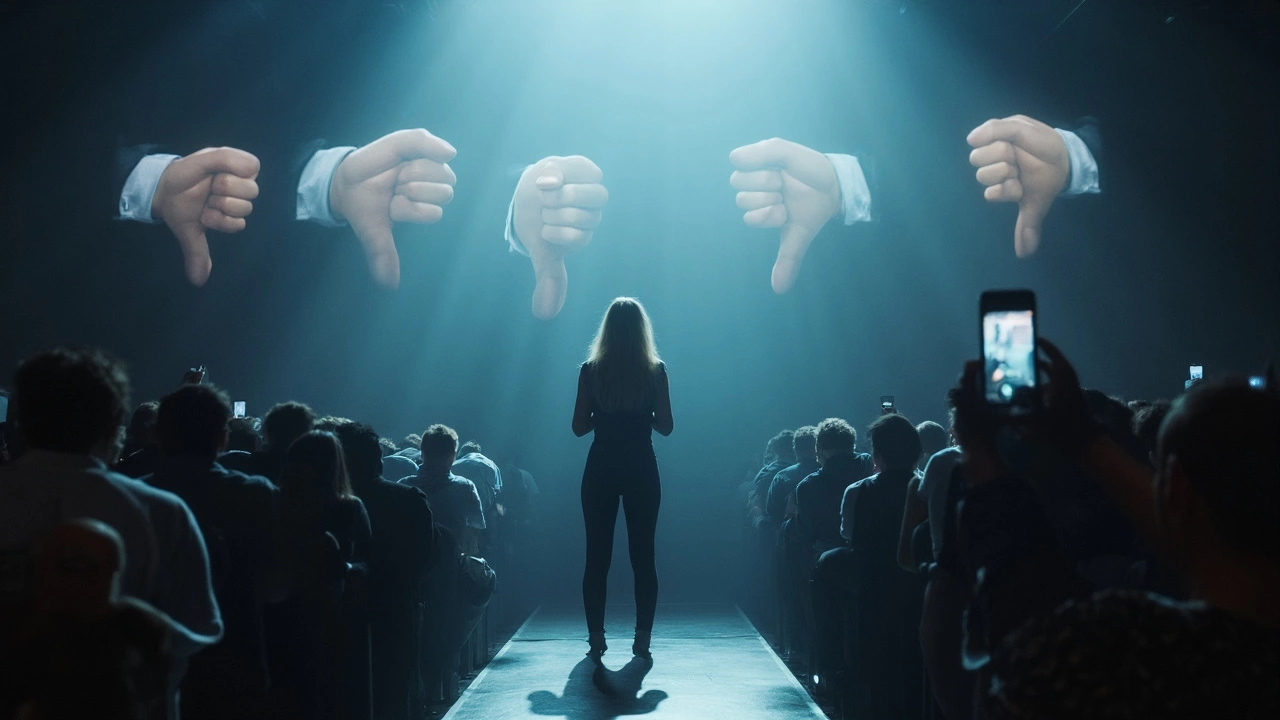Ever noticed how some songs just seem to drive people crazy—for all the wrong reasons? There’s actually one track that stands above the rest, pretty much everywhere online. It didn’t just get a couple of eye rolls or annoyed tweets. No, it broke records for the number of people hitting that little thumbs-down.
If you guessed Rebecca Black’s "Friday," you’re right on the money. This song didn’t just blow up—it got famous for all the hate it received. We're talking millions of dislikes on YouTube, more than most music videos ever see. But have you ever wondered how a pop song about the end of the school week could trigger so much rage?
- The Song That Broke the Internet
- Digging Into the Backlash
- Numbers Don’t Lie: The Dislike Record
- Can Dislikes Ever Turn Into Wins?
The Song That Broke the Internet
Back in March 2011, Rebecca Black's "Friday" hit YouTube, and nothing was the same after that. The song was a teen pop anthem, but instead of going viral for being a bop, it got slammed from almost every corner of the internet. Why did it stand out—and not in a good way? Mostly, people couldn't handle the lyrics, which some felt sounded more like a calendar than a pop song: “Yesterday was Thursday, today is Friday, tomorrow is Saturday...” It felt cheesy, and the production didn’t help either.
But the numbers tell the real story. "Friday" racked up over 3.5 million dislikes on YouTube at its peak and scored more than 167 million views. That's before YouTube even hid the dislike count for most videos in 2021. The most disliked song battle was over—Rebecca Black had the crown. For some context, here’s how it compared:
| Song | Year Released | YouTube Dislikes (at peak) | Views (approx.) |
|---|---|---|---|
| Rebecca Black - Friday | 2011 | 3.5 million | 167 million |
| Justin Bieber - Baby | 2010 | 2.4 million | 3 billion+ |
| LMFAO - Sexy and I Know It | 2011 | 1.5 million | 900 million+ |
Why did so many dislike "Friday"? Besides the song itself, the video went viral across Twitter, Facebook, and every meme-worthy site at the time. People joked about it, shared it out of shock, and soon, hating on "Friday" became a weird internet ritual. The whole thing exploded so fast, even big stars like Chris Brown and Simon Cowell weighed in publicly.
If you're curious, that level of viral hate is rare. It usually takes something shocking or unexpectedly funny, but "Friday" was just a song about looking forward to the weekend. Turns out, that was more than enough to get the whole world talking, sharing, and—you guessed it—mashing that dislike button.
Digging Into the Backlash
The release of "Friday" in March 2011 was like lighting a fuse. It didn’t just become another viral video—it became a target. Viewers weren’t just poking fun; the negative responses hit new records. The most disliked song label didn’t pop up overnight. It grew out of a perfect storm of internet humor, shared mockery, and the wild pace of YouTube shares back then.
People hated the song for lots of reasons. The lyrics were super simple. The production sounded cheap. Even Rebecca Black’s voice got slammed by critics and listeners. Most folks didn’t hold back in the comments section. Memes took over Twitter and Facebook, poking fun at the awkward dance moves and the “It’s Friday, Friday” chorus. The feedback went way beyond typical music criticism. Teenagers, late-night show hosts, and even music critics all joined in. YouTube’s then-public dislike counter just kept spinning up, making the backlash even more obvious. In a way, the hate became part of the song’s identity.
Some of it was fair, but a lot was just piling on. Looking back, many people admit they actually enjoyed the attention the fiasco got, not the song itself. Rebecca Black later talked openly about how tough it was. She faced everything from mean jokes to real online bullying. This whole drama got so big that it changed the way people thought about viral music.
| Date | YouTube Views (Millions) | YouTube Dislikes (Millions) |
|---|---|---|
| March 2011 | 10 | 0.5 |
| June 2011 | 167 | 3.2 |
| April 2018 | 122 | 3.5 |
It’s wild to see how "Friday" caught this weird mix of internet hate and viral fame. This backlash showed just how fast and loud the internet can get when people join forces for something as silly as a pop song. If you want to see the history for yourself, go check out reaction videos and parody covers—some of them actually helped keep "Friday" in the spotlight, even as the user dislikes skyrocketed. Turns out, being the internet’s punching bag can be an odd kind of success.

Numbers Don’t Lie: The Dislike Record
When we talk about the most disliked song, numbers really do tell the story. Rebecca Black’s “Friday” basically became the poster child for viral negativity. By early 2011, just a month after dropping, the music video stacked up over 3 million dislikes on YouTube. That was wild at the time—almost unheard of for any other music video then.
But it’s not just about raw numbers; it’s about context. Back in 2011, YouTube’s dislike count was front and center, so every click felt personal. The meme culture piled on, and soon, hating “Friday” wasn’t just allowed—it was almost expected. The conversation spread across Twitter, Facebook, and Reddit, where jokes and parodies just kept fueling the fire.
Here’s a look at how “Friday” compares to other famously disliked songs on YouTube:
| Song | Artist | Year Released | YouTube Dislikes (Peak Count) |
|---|---|---|---|
| Friday | Rebecca Black | 2011 | ~3.5 million |
| Baby | Justin Bieber feat. Ludacris | 2010 | ~12 million |
| It's Everyday Bro | Jake Paul | 2017 | ~5.4 million |
| Cut The Cord | Five Finger Death Punch | 2017 | ~670,000 |
It's pretty interesting that even though “Baby” by Justin Bieber actually edged out “Friday” in total dislikes later on—thanks to his huge reach—“Friday” still gets remembered as the most notorious because the hate blew up so fast and so publicly right when YouTube culture was exploding.
Notably, YouTube decided to hide the public dislike count on videos in late 2021. This move made early records like “Friday” even more iconic because viewers could still see just how much of a tidal wave of negative reaction hit back then. Those raw dislike numbers from the early 2010s are forever burned into internet history.
Can Dislikes Ever Turn Into Wins?
Getting slapped with millions of dislikes sounds like instant career death, but it doesn’t always work out that way. Let’s go back to Rebecca Black for a second. When "Friday" tanked with a tidal wave of negativity, it could've crushed her confidence and ended any hope of making music. Thing is, something curious happened: the song’s viral hate actually made her a pop culture name. She got invites to late-night shows, plenty of interviews, and became an internet meme people still talk about years later. That kind of staying power isn’t easy to snag.
Other artists have spun dislike into opportunity, too. Take Justin Bieber’s “Baby,” another track on the list of most disliked songs ever. Even though it racked up dislikes, it also pulled in billions of views and helped launch Bieber’s worldwide fame. The internet can be brutal, but all that drama means more clicks, more streams, and a longer spotlight. It’s a weird blend of love and hate, but in music, attention really does stick.
So how do artists actually flip a most disliked song into something good? Here are a few practical moves:
- Stay visible, don’t hide from the backlash. Rebecca Black did TikTok, podcasts, and music covers after "Friday." Own the moment.
- Talk honestly about the criticism. When musicians joke about their own flops, fans seem to respect them more.
- Channel the attention. If the world’s watching, drop new music or try another creative project while the buzz is hot.
One last thing: today’s music scene is all about extremes. If a song goes viral—even for being “bad”—that can still mean more listeners in the long run. So yeah, dislikes can sting, but they can also turn into unexpected wins if you play it right.





